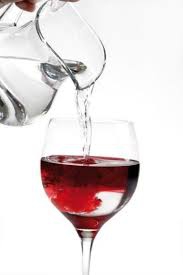Holiday or Holy Day?

Jesus said to them, "Fill the jars with water." And they filled them up to the brim. He said to them, "Now draw some out, and take it to the chief steward." So they took it. When the steward tasted the water that had become wine, and did not know where it came from (though the servants who had drawn the water knew), the steward called the bridegroom and said to him, "Everyone serves the good wine first, and then the inferior wine after the guests have become drunk. But you have kept the good wine until now." --John 2:7-10
When the Hallelujahs of Easter have passed and the Spirit has blown through Pentecost, the Church settles into the part of the liturgical year known as "Ordinary Time." It is a long stretch of ordinariness that winds its way through vacations and barbeques and continues to resist any special intensity even as school starts back up, the days grow shorter, and work again makes more demands. After all, those things are also quite ordinary. The great expanse of liturgical ordinariness doesn't lift until Advent.
While the church is being ordinary, however, the secular world still looks for things to celebrate. We celebrate Mothers and Fathers on their given days. We celebrate our country and heritage in various ways. We honor our warriors and grieve our dead. All of which leaves pastors of churches with a dilemma: Should secular holidays be recognized in church?
Some pastors shun the practice. Ordinary time means ordinary time, period, and sacred and secular shalt not mix. Other pastors have tried that, only to find themselves staring into the blazing eyes of children, who haven't darkened the door since Easter, sitting next to their corsaged mother and waiting in vain for you to mention that it's Mother's Day. I was one of those wild-eyed children on a Father's Day long ago. Only a teen, I was so mad that there was no chance to celebrate my awesome father that I actually stood up before the benediction, interrupted the service, and praised my father along with all the other fathers in the room. I was actually shaking and crying when I sat back down.
If you forget the Veterans, don't sing a patriotic hymn near the Fourth of July, or forget the particular name of someone who has died when Memorial Day rolls around, it will be your head that is rolling around next. Some fight it, others go with the flow, but everyone who has ever been charged with leading a congregation has felt the tension.
As awkward as such moments often feel, I want to suggest that there is a middle way between ignoring the event and reluctantly adding a secular moment to a sacred service. I think the core of Christian faith actually calls us to turn holidays into holy days--to see that in viewing the world through Christ, there is no distinction.
We who see the earth as the Lord's find the sacred hidden in the secular all the time. The joy of a child is a holy moment, whether that moment comes from a candle on a birthday cake or a candle on Christmas Eve. The stillness of a lake at dawn, the bustle of a busy street, a moment of intimacy between lovers--it is all holy to those who try to bring the love of God with us wherever we go.
I think that is one of the deeper meanings of Jesus' very first miracle--turning the water into wine. Jesus was at a wedding--not the sacred ceremony part of the wedding, but the days-long party afterwards. The hosts are about to be embarrassed because people still want to party and the wine has run out. Jesus enables the couple's continued hospitality by taking the ordinary water that was on hand to fulfill the ordinary Jewish laws and turning it into something special. He makes it wine.
That is how I have come to see these "secular" holidays. For many they remain just a time of secular celebration, and there's nothing wrong with that. But for those who profess to follow the one who transformed ordinary water into wine, and ultimately death into life, I think we should ask ourselves again whether "secular holiday" really has meaning. Maybe we should pour that ordinary water into the sacred cup. It might just become wine.
- annerobertson2's blog
- Login to post comments
-


